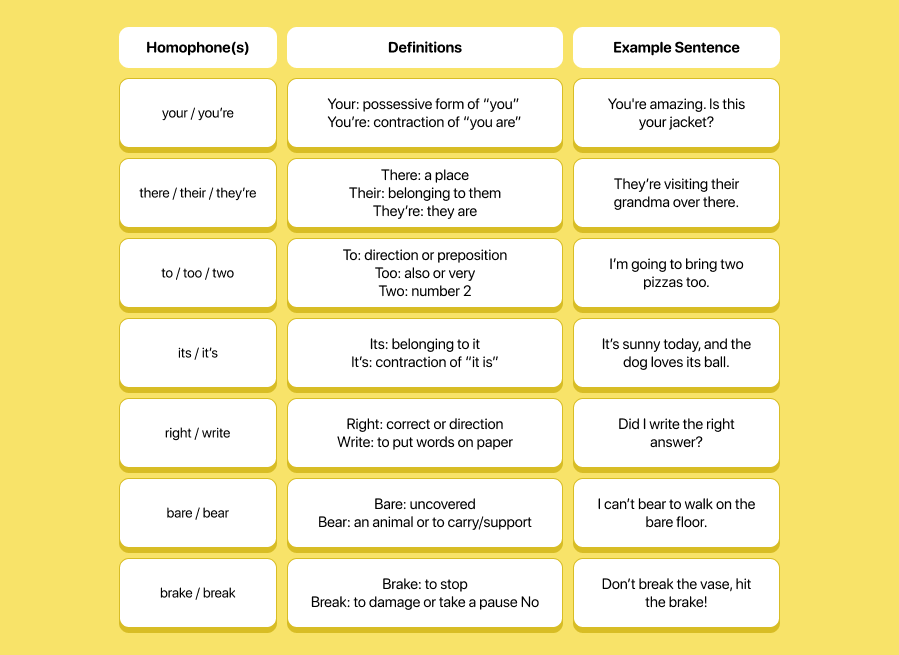Let’s face it: English can be a mess. Just when you think you’ve got it down, you run into a sentence like “They’re over there with their dog” and wonder why three totally different words sound exactly the same. Welcome to the weird, tricky, and surprisingly fun world of homophones.
If you’ve ever paused while writing to wonder whether it’s your or you’re, bare or bear, or whether write is spelled “right,” this guide is for you.
What Are Homophones?
In the simplest terms, homophones are words that sound the same but have different meanings. Most of the time, they’re also spelled differently. This makes them perfect for puns, tricky exam questions, and… frustrating typos.
👉 Meaning of "homophones":
- Homo = same
- Phone = sound
So, literally: same sound.And while the definition sounds innocent enough, these words are some of the most commonly confused in English. Why? Because when you hear them, everything seems fine, but when you write them down, they’re easy to mix up. And yes, English has a lot of them.
Why Homophones Matter (and Why They’re So Annoying)
You might wonder: “Do I really need to learn all these confusing pairs?” The answer is yes, if you care about writing clearly.
Imagine sending a message like:
“I hope your going to the party.”
Your what is going to the party?
Or posting:
“I no the answer!”
You no the answer, or you know it?
These kinds of mix-ups can change the meaning of a sentence or just make it look like you weren’t paying attention. In professional writing, job applications, school essays, or even dating profiles, misusing homophonic words can make a poor impression.
But once you get the hang of them, homophones actually become kind of fun. They’re like little riddles your brain learns to solve instantly.
The Most Common Homophones
There are hundreds of homophones in English, but some show up all the time. Let’s walk through a list of the most frequently used ones, with explanations and examples.

These are homophones you’ll run into constantly in real life. The only way to really remember them is through usage. Reading, writing, and practicing in context works wonders.
Why Homophones Are Especially Wild in English
English is full of borrowed words. It steals from Latin, French, German, Greek, and then mashes it all together with wild spelling rules and inconsistent pronunciation. That’s one big reason homophones in English are so common. Words that come from completely different roots just happen to sound the same.
For example:
- Flour (from Latin flos, flower) and flower (from Old French flur) ended up sounding identical.
- Sole (meaning “only”) and soul (spiritual essence) sound the same, even though their meanings couldn’t be more different.
Sometimes it’s just linguistic evolution doing its thing. Sometimes it’s chaos.
How to Remember Tricky Homophones
Here are a few friendly, brain-hugging ways to keep homophones straight:
🧠 Make up mini stories:
The knight rode off into the night. Imagining a scene makes it stick.
✍️ Write your own sentences:
Using the words in context helps you remember which is which.
👂 Say it out loud:
If you're unsure while writing, hearing the sentence can help spot errors.
🎨 Use visual cues:
Picture a flower blooming or a bag of flour in the kitchen. The mental image locks in the spelling.
🧾 Keep a personalized list:
Everyone struggles with different pairs. Keep a notebook or digital list of commonly confused homophones that trip you up.
Homophones can be annoying, even for fluent speakers. They mess with your confidence when you write and trip you up in fast conversations. But once you know them, they’re powerful little tools that make your English smarter, smoother, and much more accurate.


















